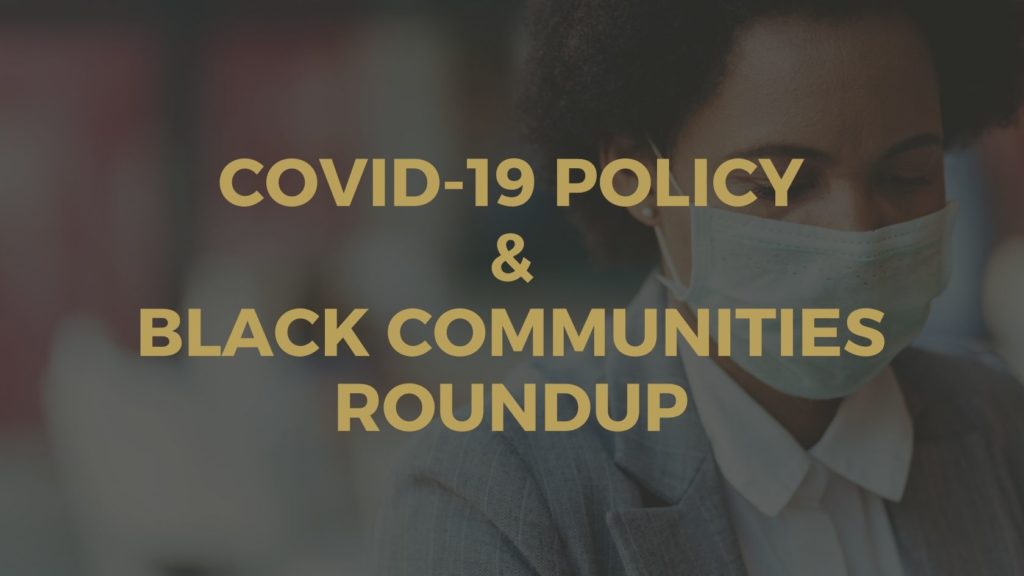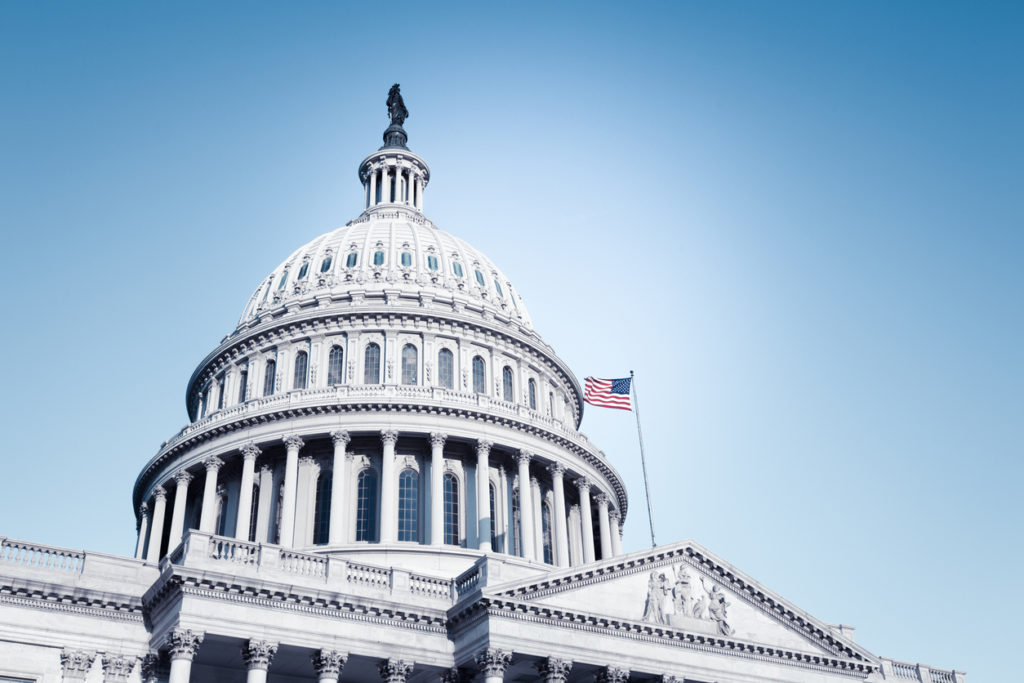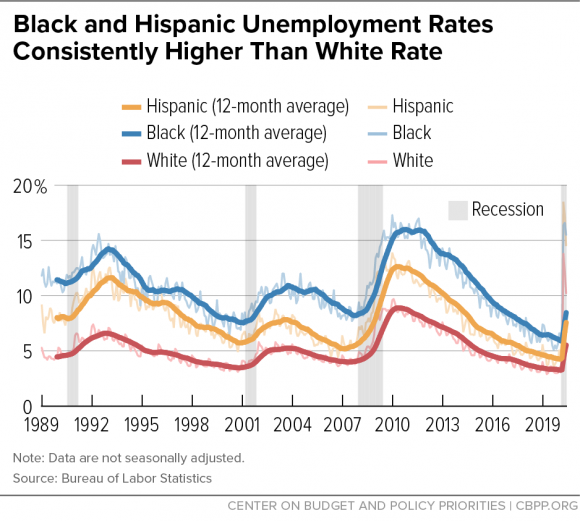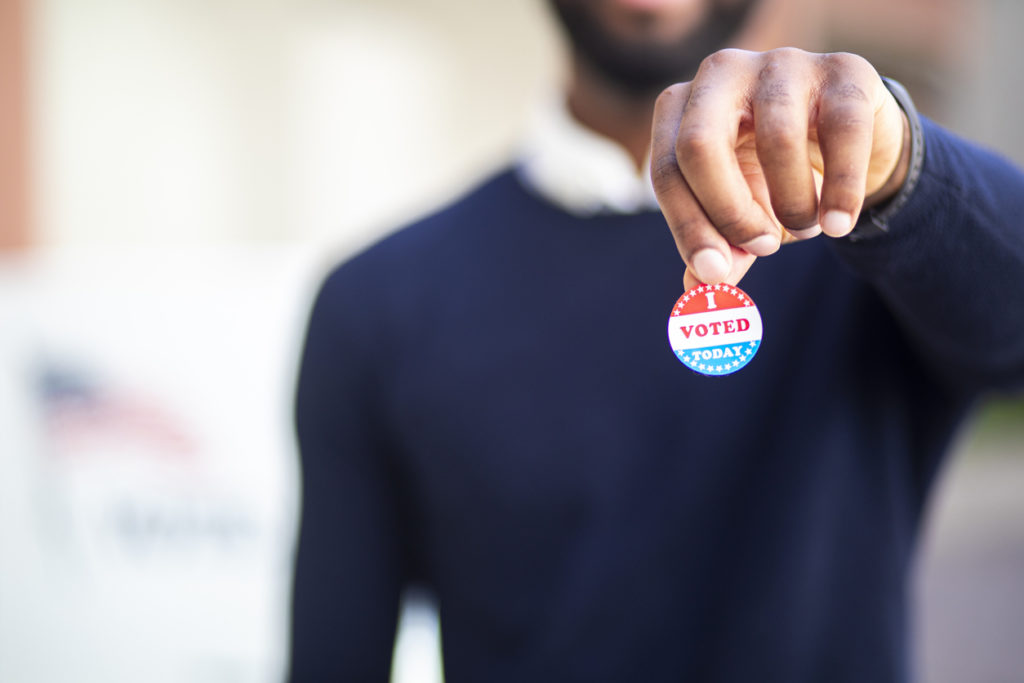
August 11 COVID-19 Policy & Black Communities Roundup
Stimulus Negotiations Stalled
Stimulus legislation negotiations between Republicans and Democrats collapsed late last week, as many Americans face economic hardship and evictions (the $600 per week supplemental federal unemployment insurance benefit expired July 31 and the moratorium on evictions from federally-backed rental properties expired July 25).
House Speaker Nancy Pelosi said that the Trump Administration rejected the Democrats’ proposal that the two sides both compromise on a $2-$2.4 trillion package that is halfway between the original packages of the Republicans ($1 trillion) and the Democrats ($3.4 trillion). Senate Majority Leader Mitch McConnell argued that Democrats have “sabotaged backroom talks with absurd demands that would not help working people.”
On Friday, Speaker Pelosi sent this letter detailing remaining differences between the two sides on funds for testing, treatment, state and local governments, schools, housing, food assistance, the Child Tax Credit, the postal service, the Census, and voting.
Divisions within the GOP have also played a role in the inability to reach agreement.
In a report released last week—Pandemic Relief Priorities for Black Communities—the Joint Center called on Congress and the Administration to extend the $600 federal unemployment benefit, and provide funding for state and local governments, Community Development Financial Institutions and Minority Depository Institutions, an emergency broadband benefit for households, laptops and Wi-Fi hotspots for students, and other measures to support Black workers, Black businesses, and Black voters. Read the entire report here.
Trump Signs Controversial Executive Orders
On Saturday, President Trump signed four executive orders intended to extend federal unemployment benefits, extend the moratorium on evictions, postpone payroll taxes, and defer student loan payments through the end of the year. Senate Minority Leader Chuck Schumer (D-NY) has called the efforts “unworkable, weak, and far too narrow.” In addition to questions of legality, the orders have received criticism about the inadequacy of benefits, the millions of renters left out of eviction relief, a hit to the Social Security and Medicare if President Trump waives postponed payroll tax payments, and the exclusion of several populations, such as states and localities, schools, and small business owners from much needed relief.

Hospitals that serve large Black populations were shortchanged in the distribution of $175 billion in federal funds, according to a study in the Journal of the American Medical Association. The systematic underfunding of hospitals in Black communities resulted from a CARES Act formula that allocated funding based on hospital revenue rather than numbers of COVID-19 cases.
Of the total $660 billion allocated as Paycheck Protection Program Funds, as of August 6, $523.4 billion in loans had been distributed and the average loan size was $101,459.
For more on Congress and COVID-19 stimulus this week, see the National Urban League’s Washington Bureau Insider.
Making an Impact: Diversity in COVID-19 Oversight

Following calls from Joint Center Board Members Paul Thornell and Robert Raben, as well as Inclusive America’s Mark Hanis, U.S. Senators Chris Van Hollen (D-MD), Kamala Harris (D-CA), Robert Menendez (D-NJ) and Cory Booker (D-NJ) introduced legislation that would increase the racial diversity of the congressional oversight commission responsible for ensuring the appropriate allocation of coronavirus relief funds. There are currently no Black, Latino, Pacific Islander, or Native American Commissioners on the oversight panel.
Broadband Policies Take Priority as Schools Reopen

With school districts across the country beginning a new academic year, integrating online and distance learning options and expanding access to high-speed broadband internet for students should be a priority (as our Joint Center stimulus report stated, over 30% of Black households with one or more children lack high-speed internet). That urgency is amplified by a December 30 deadline for broadband projects to be completed and operational in order to be eligible for pandemic relief funding provided for by the CARES Act.
Last week, U.S. Senator Amy Klobuchar emphasized the importance of broadband infrastructure investment to keep low-income students and families connected during the pandemic, and FCC Commissioner Jessica Rosenworcel and former U.S. Education Secretary John B. King Jr. called for a national policy on internet access.
U.S. Senator Tim Scott (R-SC) introduced two bills aimed at expanding broadband access in rural and other underserved communities, including legislation to create a pilot program to provide grants to Historically Black Colleges and Universities, Tribal Colleges and Universities and Hispanic-Serving Institutions.
Last week, AT&T announced a partnership with the City of San Jose, CA, to provide 11,000 hotspots to students and households without home internet access (a study revealed that nearly 100,000 mostly Black and Latino households had no such access).
Economic Studies & COVID-19
The unemployment rate for Black Americans remains high at 14.6% for the month of July, compared to 15.4% percent in June. While Black unemployment decreased by 0.8 percent over the past month, it is still the highest of all racial groups. White unemployment dropped to 9.2% in July from 10.1% in June, and the national unemployment rate fell from 11.1% in June to 10.2% in July.
Unemployment Rates for Black and White Workers April-July 2020

Source: U.S. Bureau of Labor Statistics
Weekly unemployment claims totaled 1.186 million for the week ending August 1, marking the 20th week that claims have remained above one million and exceeded the previous single-week record high of 695,000 claims in 1982.
Nonfarm payrolls increased by 1.763 million in July, bringing the three-month (May, June, July) employment gain to 9.3 million. Total employment is still 12.9 million lower than February. Economic Policy Institute Policy Director Heidi Sheirholz emphasized that “[t]here are 14 million more unemployed workers than job openings, meaning millions will remain jobless no matter what they do.” The deepening of the coronavirus-related recession is fueling concerns that an increasing number of job losses will become permanent.
The Groundwork Collaborative and the National Employment Law Project found that even with the extra weekly $600 federal unemployment benefit, a majority of the people who claim jobless benefits are likely receiving less on unemployment insurance than they did at their previous jobs when you factor in non-wage compensation such as health benefits, retirement earnings, and paid-time off.

The Center on Budget and Policy Priorities urged Congress to mitigate racial and ethnic unemployment disparities, noting that “[i]f the recovery from this recession follows the historical pattern, Black unemployment in particular will remain staggeringly high longer and come down more slowly than white unemployment.”
The Urban Institute issued a two-pronged approach to bring greater capital to communities of color by increasing capital to Black banks and supporting community development financial institutions (CDFIs) “more broadly.” According to researchers “the 21 remaining Black banks represent just 0.4 percent of the 4,681 community banks insured by the Federal Deposit Insurance Corporation (FDIC). According to Urban Institute Senior Research Associate Michael Neal, “Black banks are often able to creatively meet a diverse array of consumer credit needs within their community, producing greater access to credit to a wider group of borrowers through specialized underwriting practices that consider risk characteristics.”
The Center for American Progress’s National Advisory Council on Eliminating the Black-white Wealth Gap issued a brief with five ideas for revamping the Minority Business Development Agency (MBDA) to include: initiating an economic equity grant program to foster wealth creation in Black communities; launching a minority serving institution business center initiative; creating an office of research and evaluation to study barriers; instituting a minority business investment company program; and establishing an office of advocacy and intergovernmental affairs.
The Federal Reserve Bank of New York issued a report that showed that Black-owned businesses are disproportionately located in geographic areas hardest hit by COVID-19. Forty percent of receipts from Black-owned businesses come from just 30 counties (about one percent of all counties), and two-thirds (19 or 3) of these counties “are areas with the highest numbers of COVID-19 cases.”
Political Studies & COVID-19

BET is joining with the National Urban League (NUL) and several other civil rights organizations to organize a National Black Voter Day on September 18 to “aid Black citizens against voter suppression tactics and ensure that their vote counts in the various elections taking place in November.”
The American Civil Liberties Union (ACLU), ACLU of Florida, NAACP Legal Defense and Educational Fund, Inc., and Brennan Center for Justice at NYU Law are among the groups appealing a Florida law that requires residents with past felony convictions to pay all outstanding legal financial obligations before being able to vote.
Voting rights advocates raised concerns over the U.S. Postal Service postmaster general Louis DeJoy implementing changes that include not paying overtime to mail carriers and clerks. These changes have resulted in reports of delays in mail service. Democracy Initiative Executive Director Wendy Fields responded, “we have an underfunded state and local election system and a deliberate slowdown in the Postal Service” and that the president is “deliberately orchestrating suppression and using the post office as a tool to do it.”
President and CEO of the NAACP Derrick Johnson penned an opinion piece in Politico urging Congress to allocate $3.6 billion to ensure safe voter participation, and for states to offer alternative methods for voting. He maintained that “[g]iven the history and significance of in-person voting to the Black community, it is essential that in-person voting be expanded to ensure voter safety.”
A CDC report released Friday indicated Black children were five times more likely than white children to require hospitalization for COVID-19.
Demos reported on the BREATHE Act, which was developed by the Movement for Black Lives Electoral Justice Project to enhance police accountability, disclose police abuses, require independent reviews of the use of force, and address historical and systemic discrimination.
The Center for American Progress urged Congress to address water access and affordability beyond a one-time coronavirus stimulus, noting that “insufficient water and sanitation services are most prevalent among the same populations with the highest infection and fatality rates from the virus—namely, those in low-income communities, tribal communities, and communities of color.”
“More than 70 percent of students attending HBCUs are low-income, compared to 35 to 40 percent nationally,” according to MSN. The pandemic “played a major role in basically magnifying the inequities” between HBCUs and traditional colleges but also showed how HBCUs “can adjust and adapt,” according to Thurgood Marshall College Fund President Harry Williams.
A study of 998 households showed that 30% of Black students said the COVID-19 pandemic boosted their perceived value of a college education, as compared to 11% of white students. The survey also found that 7% of Black students planned to take fewer classes in the fall, compared to 3% of white students, 29% of Asian American students, and 24% of Latinx students.
Movement Building
AARP, Main Street America, the United States Hispanic Chamber of Commerce, Public Private Strategies, and the Association of Women Business Centers are hosting “a series of four conversations on the future of small business in America.”
Alternatives for Girls hosted a grocery giveaway in Detroit.
Black Futures Lab launched an online Electoral Action Center where voters can register to vote, check their registration status, learn more about their state’s absentee and early voting rules, and find elected officials and 2020 candidates.
Center for Black Women’s Wellness is scheduling appointments for free mammogram screenings despite the closure of their clinic due to COVID-19.

Color of Change issued a petition demanding corporations to move beyond their statements of support for Black people to actionable changes in leadership, payroll, and internal operations for Black employees, families, and communities.
The Advancement Project, Asian & Pacific Islander American Health Forum, Can’t Stop! Won’t Stop! Consulting, Demos, and The Opportunity Agenda released Map The Truth, a COVID-19 Social Justice Guide that includes resources for advocates, educators, and media personnel on the importance of racial justice.
The Leadership Conference on Civil and Human Rights, NAACP, American Association of People with Disabilities, the Georgia Coalition for the People’s Agenda, Representative Terri Sewell (D-AL), and California Secretary of State Alex Padilla hosted a press briefing call to outline the need for election funding in the next COVID-19 relief package for voter protection in the general election.
Strategic Concepts in Organizing and Policy Education (SCOPE) issued a petition to California state officials demanding the passing of #AB1253, a tax on California billionaires who have seen their wealth increase since the beginning of COVID-19.
Events
Upcoming events include “State of the Schools 2020: The Educational Costs of the COVID-19 Pandemic” (Urban Institute, August 12); “Media and Narrative Building on Homelessness and COVID-19” (National Law Center on Homelessness & Poverty, August 12); “Responding to the COVID-19 Crisis: Closing the Racial Wealth Gap in the Shadow of the Pandemic” (Urban Institute; August 12); “Black Households & COVID-19: Impediments to Economic Security” (The Hamilton Project; August 13); “COVID-19 and the Economy” (REMI, August 13); “Feeding our Families” (Alabama Arise, August 18).
Last week’s events were held by the Brookings Institution, Congressional Black Caucus, Center for American Progress, National Urban League, NCNW, New America, Mississippi NAACP, Rainbow PUSH Coalition, The Leadership Conference on Civil and Human Rights, and the Urban Institute.
Podcast
The Brawl Over Back to School (Politico)
The Joint Center thanks the Annie E. Casey Foundation, the Boulé Foundation, the Democracy Fund, UPS, and the Walmart Foundation for additional support that has allowed us to do some of our COVID-19 and Black Communities work.

